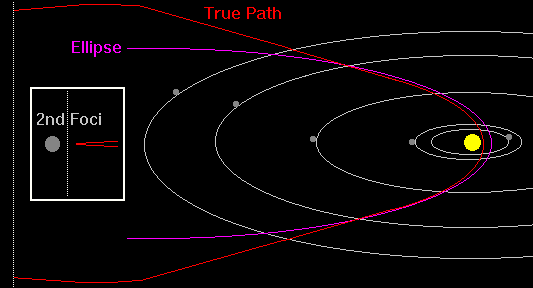
| |
 |

Repeating comets are attracted to the Sun, are heading for it, but miss due to the same sensitivity to the solar wind that causes their dust clouds and gasses to blow away from the Sun. Humans assume that tiny particles will be more affected by the solar wind than larger particles, but this assumption is wrong. If this were the case, then how to explain the Asteroid Belt, which has trash of all sizes, seemingly unaffected by the solar wind. A small object may lose its velocity faster than a larger object, due to the gravitational differences, but the effect is the same when they are sensitive to the solar wind - they are pushed away. Comets that hit the Sun have, through repeated trips around the Sun, lost enough water vapor so that the balance of their composition weighs against repulsion by the solar wind. In short, they've lost their protection. They come zooming in from outer space, but this time, they don't veer out, they collide. In fact, comets close their orbits, coming closer and closer to the Sun, during this process.
Where a repelling force exists, such as the solar wind against a comet, the comet will veer out upon approach and as it gains speed coming into the Solar System, veer in again. The increasing speed of comets allows them to push past their sensitivity to the solar wind, to some degree. Thus they have a quick trip around the Sun while held at the distance where they are essentially getting a blast of wind they cannot proceed against.
The solar wind is steady, its change incremental, as with every measure closer the intensity increases by a similar steady measure. The length away that the comet maintains is not explained by an analogy such as a car hitting a brick wall or a diver entering the water or even a man walking into a hurricane. The comet is slipping to the side as it approaches, going in the direction of least pressure, of least resistance, while still aiming for the Sun. The point where this balance is reached is dependent on the speed of the comet, which increases steadily the closer it gets to the Sun, and the intensity of the blast from the solar wind. At every point along its orbit, these determinators are at play. When out in space the comet's pace is relatively sedate, and thus slides to the side rather than approaching the Sun directly. When it enters your Solar System the reverse is occurring - the speed effect overcoming the solar wind push, so that the comet curves toward the Sun, but always these two factors are at play.
Quite clearly some comets are periodic, as they appear regularly after a set number of years, approach from the same direction, turn around within the Solar System at the same place, exit the Solar System in the same direction, and give the same predictable appearance. But comets that have a long period have been documented in the past in a manner that leaves much doubt. Where astronomers within this very millennium assumed the Sun orbited the Earth, just how accurate can their records have been? And how does one know that a previous comet is returning, even when it approaches from the same direction? Is it not possible to have more than one comet with the same track through the Solar System? Humans are barely out of the Dark Ages, and if honest would admit that they are guessing. Do they have these comets marked? Do they have an accurate basis of comparison? What are they judging on, the pencil sketch made by someone in antiquity?
The human argument that the long orbit can be determined by the angle of entry, the parabolic curve, is therefore absurd. Some long period comets have several foci, and some only one. Just how does blind man, peeping up from a planet he cannot leave, looking out from a Solar System he has never left, know how many foci this or that comet has? Since a parabola and even an ellipse smoothes to an essentially straight line, how do they know how far that straight line goes before a turn around is effected? They do not. They are guessing.